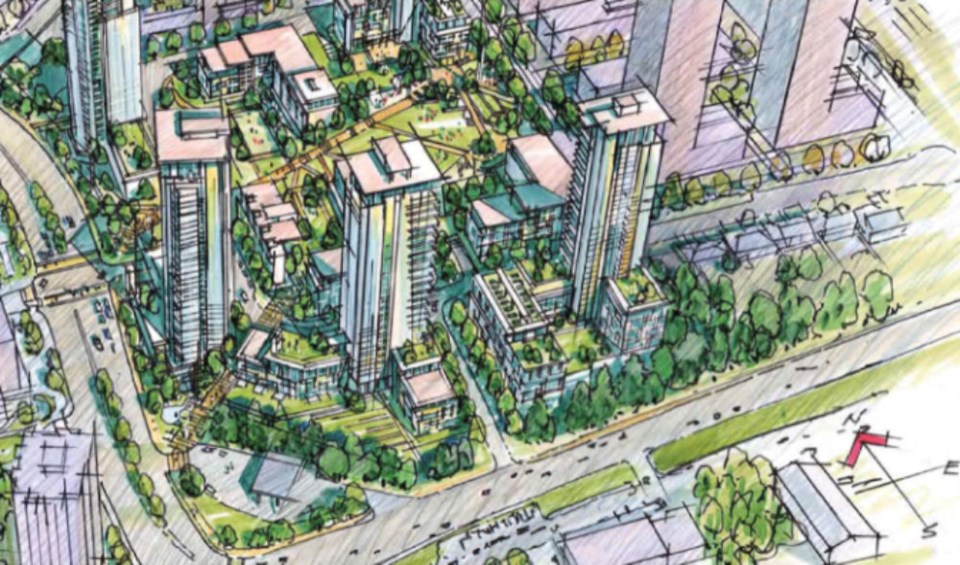The proponent for a massive redevelopment of Port Moody’s Coronation Park neighbourhood says the project should be exempt from a new city policy that requires dense new multi-unit developments provide at least 15 per cent of the units be affordable rentals.
Evan French, the senior development manager for Wesgroup Properties, told the Tri-City News the company’s proposal to construct 2,655 new homes in the 14.8-acre site across from the Inlet SkyTrain station should be grandfathered out of the new inclusionary zoning policy that was endorsed by council on April 19, as it’s already well into the approval process.
The project, which includes six high-rise condo towers up to 31 storeys tall, a rental building, office and retail space, as well as a daycare, 2.5 acre park and community amenity structure, was granted an amendment to Port Moody’s official community plan (OCP) in a vote by council early Wednesday morning following a marathon public hearing.
Port Moody’s general manager of community development, Kate Zanon, said even though the new policy doesn’t apply to projects already in the process of being considered by the city, Wesgroup has yet to apply for zoning amendments that would allow the Coronation Park project to proceed.
That contention was further bolstered by a motion from Coun. Hunter Madsen that the 15 per cent minimum number of affordable units be applied to it.
The motion passed, although the only dissenter, Coun. Diana Dilworth, warned such a proviso could become a barrier for further negotiations with the builder to improve its amenity package so it includes affordable housing.
“Save some of that gritty energy for when it really gets down to the down and gritty of rezoning and development applications,” she said.
French said Wesgroup’s rezoning application would already be well underway were it not for earlier dithering by council that included a reworking of the proposal to reconfigure the site but was ultimately rejected, along with an error that resulted in a three-week delay to the public hearing into the OCP amendment.
“We have been trying to prepare a rezoning application for submission with earnestness,” French said.
“But with all the various changes requested by council at all of the meetings in front of us, we have not been able to progress a rezoning application as the goalposts continued to shift.”
He added the company anticipates submitting its application with the next 60 days.
WHAT IS THE NEW POLICY?
The new inclusionary zoning policy requires a minimum of 15 per cent below-market rental units be included in any new multi-unit development with a density greater than 2.0 floor area ration (FAR).
The requirement could also be fulfilled with at least six per cent non-market rental units.
(FAR is the relationship between the usable floor area in a building to the gross area of the lot upon which it is built)
As well, any project with 10 or more affordable units would have to ensure at least 10 per cent of them are three-bedroom units, at least 20 per cent have two bedrooms and the remaining 70 per cent could be one-bedroom or studio apartments.
The affordable units would have to be managed through a non-profit society or BC Housing, and secured for at least 60 years.
Projects where all units are market rental would be exempt from the policy, and staff is expected to report back to council in year on the impacts of the new directive.
But a report prepared for council by Coriolis Consulting Corp. cautioned an inclusionary zoning policy could make certain types of development projects financially unviable — plummeting property values for those sites by as much as 47 per cent from their worth if no affordable housing component was required.
“Below-market units are just less valuable to whoever owns them,” Coriolis principal Blair Erb told councillors.
That’s a problem, said French, especially for companies that purchased properties for development before the advent of the inclusionary zoning policy and have been caught off guard.
“We don’t believe that many land owners were aware of this having potentially significant impacts to their property values,” he said.
“Any developer who acquired a site without the expectation for an affordable housing requirement will have difficulty in providing the affordable housing units as they would not have factored the requirement into the land acquisition decision.”
‘EYES WIDE OPEN’
Erb cautioned the city will have to temper its expectations of developers and “have eyes wide open when expecting below market rental.”
He added, “We would anticipate there would be fewer projects coming forward.”
Still, there’s room to move, said French.
The new policy does allow flexibility for proposals that include other significant community benefits with a demonstrable value, as well as those where an independent economic analysis concludes the project can’t viably support affordable rental units.
Wesgroup’s package of community amenities for Coronation Park is worth about $86 million and French said an analysis by Coriolis has already concluded the project can’t support affordable housing without adding more density.
“We have consistently stated that the project has a limited ability to provide affordable housing based on the benefits council has directed it to provide without the addition of more density to offset the cost,” he said. “Wesgroup has endeavoured to be completely transparent with council and the community throughout this process.”
WHERE ELSE HAS SUCH A POLICY?
Inclusionary zoning policies are also in place in some neighbouring communities.
Burnaby implemented a rental use zoning policy in 2020 that requires 20 per cent of units in new multi-unit project be affordable rentals.
But, Erb pointed, out, projects there are much more dense than is currently allowed in Port Moody.
New Westminster’s inclusionary housing policy mandates five to 20 per cent of new units be non-market rental depending on whether or not development applications require amendments to the city’s official community plan.


